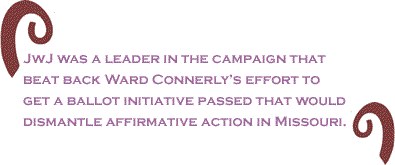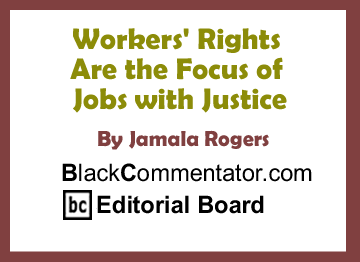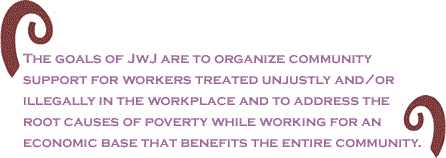
|
||||||||||||||||||||||
|
||||
 |
||||
| A decade ago, Jobs with Justice was established in St. Louis. It joined a growing number of cities that make up an expansive grid under the national Jobs with Justice founded in 1987. JwJ chapters build a coalition of labor, religious, student and community organizations that are committed to working on issues that impact workers. On both the local and national levels, they are making impressive waves as the challenges facing the US workers multiply.
What makes the mission of JwJ unique is that is brings together a broad cross section of the community to accomplish those goals, a structural tent that really doesn�t exist elsewhere. The alliance includes labor, religious, student and community organizations all working together on a common project, issue or campaign.
The goals of JwJ are to organize community support for workers treated unjustly and/or illegally in the workplace and to address the root causes of poverty while working for an economic base that benefits the entire community. These sound like lofty goals but the St. Louis Jobs with Justice hit the ground running racking up some impressive victories. Its first major campaign was the living wage. Convening organizations, the Association of Community Organizations for Reform Now (ACORN) and the Service Employees International Union Local 880, along with JWJ, pressured the city of St. Louis to implement and enforce the Living Wage Ordinance passed by 80 percent of city voters, a majority in every ward. The ordinance required businesses with large city contracts or tax breaks to pay their workers a living wage. The living wage ordinance has been a critical foundation and reference point for later campaigns, including Justice for Janitors and the Living Wage Sit-In at Washington University. Several years later, JwJ successfully took on passing a living wage for the state of Missouri.
Other campaigns and issues include the Immigrant Freedom Ride which lifted up the struggle of immigrant workers and the need for a humane immigration reform. JwJ was a leader in the campaign that beat back Ward Connerly�s effort to get a ballot initiative passed that would dismantle affirmative action in Missouri. Right now JwJ is nose-deep in the health reform battle as affordable and accessible health care is one of the most critical issues facing working, laid off and retired people. The decade of growth and development has not been easy and without its challenges; it is the burden of any body or bodies trying to bring together disparate parties to work towards a common purpose. JwJ is now a statewide organization and we all know that Missouri does not have a stellar track record of treating its workers well. Jobs with Justice is committed to being the vehicle that will drive the issues of all workers to the House of Human Rights where strategy meets activism. BlackCommentator.com Editorial Board member Jamala Rogers is the leader of the Organization for Black Struggle in St. Louis and the Black Radical Congress National Organizer. Click here to contact Ms. Rogers. |
||||
 |
||||
If you would like to comment on this article, please do so below. There is a 400 character limit. You do not need a FaceBook account. Your comment will be posted here on BC instantly. Thanks. Entering your email address is not mandatory. You may also choose to enter only your first name and your location.
|
||||
Thank you very much for your readership. |
||||
| Any BlackCommentator.com article may be re-printed so long as it is re-printed in its entirety and full credit given to the author and www.BlackCommentator.com. If the re-print is on the Internet we additionally request a link back to the original piece on our Website. | ||||
| |
||||
| November
19 , 2009 Issue 351 |
| Executive Editor: Bill Fletcher, Jr. |
| Managing Editor: Nancy Littlefield |
| Publisher: Peter Gamble |
| Est. April 5, 2002 |
| Printer Friendly Version in resizeable plain text format |
 |

|
 |
| |
| |














































